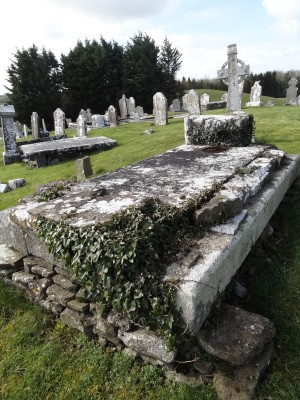LA-TLRE-0030
Beneath this tomb are laid the remains of Mrs. Mary Tyrell (alias Ryan) here of Ballyroan, who died on the 14th day of June 1833 aged 70 years, also her son Patrick Tyrell who died on the 4th October 1827 in the 36th year of his age, also her daughter Elizabeth who died on the 21st day of August 1817, aged 18 yrs, and Mabel and Frances, two of her children who died young. This stone has been placed in their memory by the Rev. Thos Tyrell, Parish Priest of Tinryland, Staplestown, Urglin, Co. Carlow.
Rev Thomas Tyrrell P. P. Tinryland
A Political Priest
by John Scott (www.tinryland.ie/download/ro1996.pdf)
Fr. Thomas Tyrrell was a native of Ballyroan, Co.Laois. He was PP of Doonane from 1815 to 1823 when he was transferred to Tinryland where he remained until his death on 24 August 1842.
Many of his parishioners at this time were tenants of the landlords Bruen and Beresford and this probably began his interest in politics.
At this time in Carlow the Borough of Carlow sent one representative to Parliament and the County sent two. The bill giving Catholic Emancipation was made law on 13 April 1829. A separate bill was passed at the same time, which raised the county franchise from forty shillings to £10. This had the effect of reducing the number of people who could vote in the County constituency from about 4000 to 530. This was an attempt to limit the effect of the emancipation bill and it deprived many forty-shilling freeholders of the vote. The very people who had forced the question of emancipation were to be deprived of the fruits of it. This just added to the feelings of bitterness, which had built up over the previous decade.
However a Reform Bill was passed in August 1832 and it increased the electorate in the County to about 1246. Also, the borough franchise was extended to £10 householders, the same as in England. Special sessions for the registration of new voters were set up and the number of people entitled to vote in the next borough election would be considerably greater than the thirteen who had the vote in the last one. In the 1832 election 278 people had the right to vote in the Borough. It must be remembered that at this time voting was not secret and sometimes the local papers published a list of the voters and how they cast their votes. The landlords expected that their tenants would vote as directed by them.
The previous elections in the County from the Act of Union in 1801 were just contests between various landlords. Now with the coming of Catholic Emancipation and the passing of the Reform Act the power of the landlords could be challenged. This was the situation into which Fr. Tyrrell threw his energies. In May 1830 he addressed a Poor Law meeting in Maryborough and he also proposed a motion at a Reform meeting in Carlow on 24th May, 1832. He seconded Wallace, the Liberal candidate, at the election in December 1832. Wallace and the other Liberal candidate, Walter Blackney were elected. The Conservatives tried to have the result overturned and a Parliamentary Committee investigated the election. Fr. Tyrrell travelled from Tinryland to London and gave evidence before this committee in May 1833.



